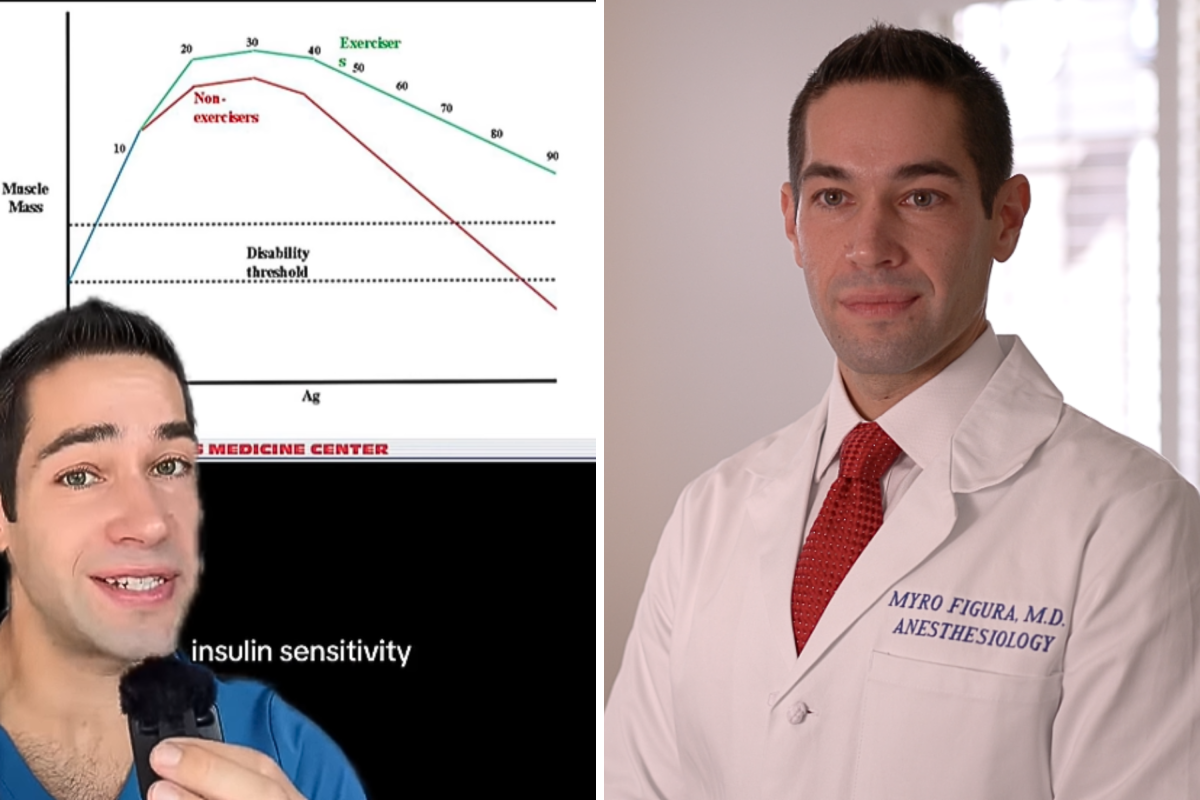For years, many of us had been told that keeping type 2 diabetes at bay came down to keeping your body weight down. While this is true, a California-based doctor has revealed a key factor within this prevention plan that is often forgotten.
Myro Figura, a board-certified anesthesiologist practicing in Los Angeles, took to Instagram on October 30, 2024 to warn his followers that while managing your weight, diet and general health are paramount in preventing diabetes, the importance of building muscle should not be cast aside.
"Muscle is metabolically active and it is thought to be the 'longevity organ' of the human body," Figura, who began posting online in 2022 to combat medical misinformation, told Newsweek. "Keeping active with resistance weight training is important for diabetes prevention, and even reversal in some cases.
"It can also help preserve your quality of life into your elder years, and even your ability to fight and survive diseases like cancer for longer."
Figura had told viewers on Instagram, where he is known as @doctormyro, that muscle is responsible for one's "insulin sensitivity." He explained that people are predisposed to lose muscle mass after hitting 30, which becomes an issue when considering diabetes because muscle helps the body process sugar.

Having low insulin sensitivity, or insulin resistance as it is sometimes called, leads to muscle, fat and liver cells failing to respond to insulin—the hormone responsible for regulating blood sugar.
"Skeletal muscle as your biggest organ of the body is responsible for 80 percent of metabolism of glucose," Figura said in the video, adding that his advice was centered around type 2 diabetes.
"When you exercise and you use that muscle you actually make your body more sensitive to insulin," Figura continued in the clip. "This is exactly the mechanism where insulin can reverse prediabetes and even early stages of diabetes."
The physician had created his video by stitching his commentary over another content creator's post. The creator, whose handle has not been mentioned, had shared that despite her thin physique and young age, she was in fact prediabetic.
"I need you to listen to me, it doesn't matter what your body shape looks like, when you are 30-plus, if you do not have muscle mass your body is going to have a hard time processing sugar," the creator told viewers online.
Viewers of Figura's clip were able to see the physician nodding along to the woman's admission. He went on to show a graph which compared how long people who exercise, and thus retain some muscle mass, and people who do not exercise stay fit and healthy.
Viewers were able to see that those who do not exercise reached "disability threshold" in their later decades, while those who do exercise never did due to the muscle they had kept in place for longer and their stronger ability to break down sugar.
Sam Setareh, a staff cardiologist at Cedars-Sinai Medical Center who also serves as the director of clinical cardiology at Beverly Hills Cardiovascular, agreed that keeping tabs on your muscle mass is a crucial step in warding off diabetes.
"It is true that even if someone is slim and otherwise healthy, low muscle mass can increase the risk of prediabetes," Setareh, who often counsels patients on metabolic health and insulin resistance, told Newsweek. "Muscle tissue plays a crucial role in glucose metabolism—it acts as a primary site for glucose uptake and storage.
"The more muscle mass a person has, the more glucose their body can efficiently process and utilize, reducing the likelihood of insulin resistance."
Low muscle mass, on the other hand, leads to less tissue being available to absorb glucose, which can result in higher circulating blood sugar levels and an increased risk of developing prediabetes.
"Traditionally, diabetes prevention messaging has emphasized weight management, healthy eating, and reducing sugar intake because excess weight—especially visceral fat—drives insulin resistance," Setareh, who previously worked as the executive member of the medical board of Mount Sinai Morningside and Mount Sinai West Hospitals, added. "Despite this, newer research highlights the importance of muscle mass as a key metabolic regulator.
"Strength training and resistance exercises help improve insulin sensitivity independent of weight loss, making muscle-building an essential component of diabetes prevention."
Sharing Advice Online
Figura had felt compelled to begin sharing his insights online after the COVID-19 pandemic, due to the amount of "medical misinformation" he had spotted on popular platforms like TikTok and Instagram.
"I thought it would be a good idea to explain, or correct, these creators from the perspective of a practicing doctor," he said. "I found that in the clinic I can only take care of a few patients a day, but online I have the potential to reach and educate millions with just one video.
"The impact is truly unbelievable and I think more health care workers should be online educating the public, it is our duty," he added.
Is there a health issue that's worrying you? Let us know via health@newsweek.com. We can ask experts for advice, and your story could be featured on Newsweek.
Is This Article Trustworthy?
Is This Article Trustworthy?
Newsweek is committed to journalism that is factual and fair
We value your input and encourage you to rate this article.
Newsweek is committed to journalism that is factual and fair
We value your input and encourage you to rate this article.
About the writer
Melissa Fleur Afshar is a Newsweek reporter based in London, United Kingdom.
Her current focus is on trending life stories and ... Read more



